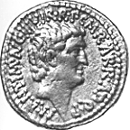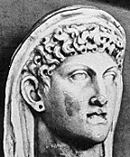Antony and Cleopatra
| Shakespeare's Antony and Cleopatra covers a ten year period from the end of Antony's first visit to Egypt until its conquest by Octavius Caesar*, and Cleopatra's suicide. |
After the battle of Philippi, Antony returned to his dissolute lifestyle. When he summoned Cleopatra VII of Egypt, she sailed up the river Cydnus aboard a luxurious barge, on which she lay dressed like the goddess of love; the rumour spread that Venus was come to feast with Bacchus, for the common good of Asia. Click here for more about Antony's and Cleopatra's associations* with different gods.
Sympathy for Cleopatra?
One of the most striking ways in which Shakespeare's play differs from the account of Plutarch is the emphasis he puts on Cleopatra. In Plutarch she is mentioned only in the context of Antony and his gradual decline; in Shakespeare she is given much stage time on her own, and the whole of the fifth act after Antony dies is focused on her. Unlike Lady Macbeth, she is given room to develop full tragic stature.
Shakespeare reduces Cleopatra's share of guilt in the fatal battle of Actium: in Plutarch she persuades Antony to fight at sea against his better judgement; in the play it is Antony who decides to fight at sea*.
Like Elizabeth I, Cleopatra VII was a powerful ruler in her own right; it is a measure of Shakespeare's independence from his source that he created her as a woman of great strength as well as of fascination*.
Did Shakespeare plagiarise some of his material from Plutarch? Judge* for yourself.
Footnotes
-
To fight by sea?
Antony announces the decision, and Cleopatra supports him:
Fighting by sea
Antony: Canidius, we
Will fight with him by sea.
Cleopatra: By sea, what else?
(3.7.27-28) -
Cleopatra's "infinite variety"
Enobarbus' great tribute to her fascination is not found in Plutarch:
Age cannot wither her, nor custom stale
Her infinite variety.
(2.2.241-42) -
Isis and Osiris
Two of the most popular religions were the Egyptian cult of Isis and Osiris, and the Greek cult of Dionysus, or Bacchus. Isis was one version of the Great Mother, a fertility goddess whose rituals centred around the murder of her son-husband Osiris and her act of resurrecting him. She was a goddess of magic, linked with the rejuvenating powers of the serpent and the Nile, as well as representing Justice and the Sun. Egyptian Queens were customarily worshipped as Isis incarnate; Cleopatra VII developed her own cult as Isis-Aphrodite.
Dionysus
Dionysus, the god of wine and vegetation, represented the vital energy of life, both sublime and destructive. His votaries (Bacchantes) were possessed by the god amid ecstatic dancing and revelry. By thus submitting to their passions, they experienced a release from society's restraints and a reunion with the primal forces of nature. Greek drama originated in Dionysiac ritual.
Mars and Hercules
Shakespeare associates Antony as much with Mars and Hercules as with Dionysus. In the opening lines of the play, Philo laments that Antony has declined from the man whose "goodly eyes / That o'er the files and musters of the war / Have glowed like plated [armoured] Mars" to one who looks "upon a tawny front"--Cleopatra's dark-complexioned face.
-
Antony and Ceasar
Shakespeare softens the actions of Antony as much as he does those of Cleopatra. For example, Antony had two children by Octavia, but the play gives the impression that his association with her was much briefer.
On the other hand, Shakespeare shows clearly both the excesses of Antony's reactions as his fortunes decline, and the final generosity of his response when he discovers that Cleopatra is after all alive. The lovers are to the end convinced of the splendour of their love.
Octavius Caesar was a better administrator than general. The play emphasises his intelligence and political skill in playing one rival off against another. It also contrasts Caesar's cold manipulation (of Octavia, for example) with Cleopatra's passionate manipulation and Antony's more direct style.
Caesar's victory ensured that the Roman Empire would be dominated by the Latin West rather than the Greek East; his great achievement was to establish the inevitable imperial government (at first safely disguised in Republican forms), which brought the Pax Romana (Roman Peace) so long desired.
-
Plagiarism or inspired borrowing?
Shakespeare adopts many of North's already poetic phrases, heightening the language in the process--and he puts the speech into the mouth of the normally blunt and unpoetic Enobarbus, thus increasing the sense of Cleopatra's charisma.
North's translation of Plutarch.
Therefore, when she was sent unto by divers letters, . . . she disdained to set forward otherwise, but to take her barge in the river Cydnus; the poop whereof was of gold, the sails of purple, and the oars of silver, which kept stroke in rowing after the sound of the music of flutes, howboys [oboes], cithernes [guitars], viols, and such other instruments as they played upon in the barge.
And now for the person of her self, she was laid under a pavilion of cloth of gold of tissue, apparelled and attired like the goddess Venus, commonly drawn in picture: and hard by her, on either hand of her, pretty fair boys apparelled as painters do set forth god Cupid, with little fans in their hands, with the which they fanned wind upon her.Shakespeare.
The barge she sat in, like a burnished throne,
Burned on the water: the poop was beaten gold;
Purple the sails, and so perfumed that
The winds were lovesick with them; the oars were silver,
Which to the tune of flutes kept stroke and made
The water which they beat to follow faster,
As amorous of their strokes. For her own person,
It beggared all description: she did lie
In her pavilion, cloth-of-gold of tissue,
O'erpicturing that Venus where we see
The fancy outwork of nature: on each side her
Stood pretty dimpled boys, like smiling Cupids,
With divers-colored fans, whose wind did seem
To glow the delicate cheeks which they did cool,
And what they undid did.
(2.2.193-207)

